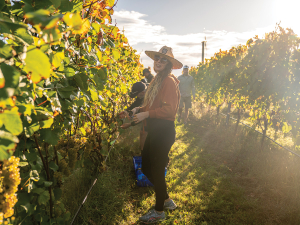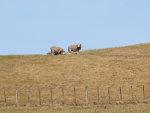While Cyclone Gabrielle "smoked" some grapegrowers in Hawke's Bay this season, others are reporting stellar results thanks to a long late summer.
Te Mata Chief Executive Nick Buck calls it a year of extremes - "long, hot and humid" - but believes the vintage will surprise people, with some growers able to soak up ideal autumn conditions, depending on site, variety and crop loads. "We will have some of the best Cabernet-based wines we've ever made," he says. "And definitely some of the best Sauvignons as well."
Hawke's Bay Winegrowers Executive Officer Brent Linn says "very impacted members" were in the minority in February's disaster, with about 300ha of the region's 4,800ha struck hard by cyclone-induced flooding. "For them it is extremely significant." However, while all the region's grapegrowers battled with disease pressure in a very wet season, those with later ripening varieties were able to enjoy an extended summer through March and early April.
That second summer came with dryer conditions, cooler nights and a drop in the humidity felt through January and February, mitigating disease pressure. "Given some of those vineyards had 200mm dropped on them three or four weeks before vintage, late season reds were surprisingly clean," Brent says, while also noting the quality of the later Chardonnay blocks. "That was a nice silver lining to what happened."
Nick says the 2022/2023 grape growing season recorded the second highest number of growing degree days on record, due to its duration and "unsurprisingly for most people it was one of the wettest". It was also the longest growing season his farmily has experienced in 50 years at Te Mata, from budburst to the end of harvest, as well as the longest harvest, stretching to nearly eight weeks.
The successful vintage resulted from a "huge effort" in their vineyards, he says. Early spring budburst yielded fruitful vines, and Te Mata dropped more fruit than typical, heeding forecasts of a wet and warm season. They also worked hard in the vineyards to mitigate disease pressure, including vigilance in keeping canopies open. That work and lighter crops proved "enormously beneficial", Nick says, noting that outcomes from the challenging season would be determined by "location, varietal weighting, and crop loads".
Harvest started under pressure, with rainfall before, during and after Cyclone Gabrielle. That put early varieties at risk, including Pinot Noir and Chardonnay. But the impacts depended on individual sites, Nick says, with a nod to Hawke's Bay's subregional diversity. Te Mata operates in the Havelock Hills, Bridge Pa, Gimblett Gravels and vineyards in the upper Dartmore Valley, and "we saw a big range across those and across varieties". The best of them were "really extraordinary", he says, singing the praises of Bordeaux varieties this year. Cabernet, Merlot and Cabernet Franc were "outstanding", with some of the smallest berries on record, intense concentration, and "massive degrees of ripeness", he adds. "We didn't finish picking those until April 17, which was two full months after Cyclone Gabrielle." Syrah was also strong, and Sauvignon Blanc proved a "star of the vintage".
Meanwhile, some growers on the 300ha of vineyards flooded by Cyclone Gabrielle were able to clean out debris and harvest fruit, while others wrote off the vintage, Brent says. A portion of growers on the 140ha of vineyard "smoked" by the event, "eitther in part or totality", have already made plans to redevelop, he says a day after the Government announced $133 million of funding for cleaning up silt and debris in Hawke's Bay. That was a relief for many, after waiting many weeks "in limbo", Brent adds. "It's been very difficult for some of them."
Support from other wine regions was swift in the wake of the cyclone, with machinery operators, vintage staff and rebuild assistance offered. In addition to those non-financial offers, there was "significant financial support" from regional organisations and individual wineries. The Hawke's Bay Winegrowers Charitable Trust received $300,000 of direct funding "from people interested in seeing the wine industryback on its feet in Hawke's Bay," Brent says. Two thirds has been paid out through two funding rounds, based on the scale of loss, with the remaining $100,000 to be allocated in a third round.
Among the many fundraising efforts was the Webb's Auction House sale of a 6,000ml and 9,000ml bottle of 2021 Te Mata Coleraine, for $1,958 and $3,183 respectively. Nick says the company is deeply committed to Hawke's Bay, having made wine there for 126 years. "We're Hawke's Bay through and through", he says. Donating the big bottles of prized Coleraine from the excellent 2021 vintage was an opportunity to assist those hit by the cyclone. But he says many of the best examples of charity after the disaster were "lots of little community things", such as staff at Te Mata giving up their homes to cyclone victims. "Hawke's Bay has just been named one of the 12 'Great Wine Capitals of the World', and the strengths of this region really shone in 2023."














